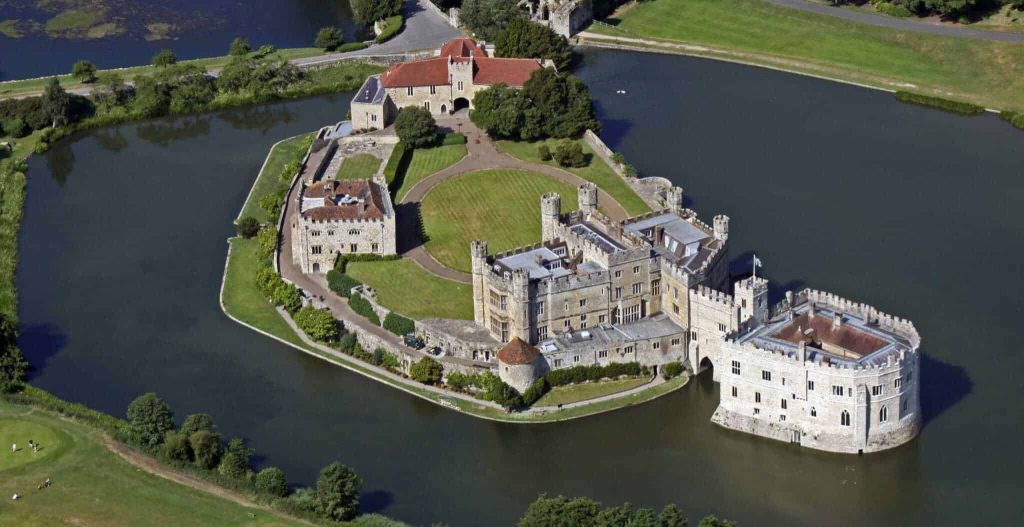Years ago, during our time serving in the Air Force, we were stationed at RAF Alconbury in England. One of our goals was to use the weekends to explore ancient monuments, ruins, and especially castles like Warwick Castle or the infamous Leeds Castle.

The visits with our young children were fascinating. We learned about England’s medieval history, about knights, kings, queens, and royal families. We walked in dungeons that reminded me of what prison must have been like in biblical times (though these were upgrades, from what I’m told). What was unmistakable about each visit was this: castles represent wealth. You had to be extremely wealthy to be lord of the castle.
Castles offer protection from invaders. Paradoxically, castles were also clear targets for enemies to invade. The fortifications required vigilant watch by guards, 24×7. When attacks were imminent, royal staff found themselves secure in the “keep” or even the “inner keep” if your castle was equipped with such. Tolkien’s Lord of the Rings dramatically displayed this structure during its epic battle scenes.
Here’s the lesson and the point of this post. The wealthiest in our community are the most protected in society. While there are no castles to run into, those who have accumulated wealth find themselves in the “inner keep” when troubles invade — financial troubles like recessions, depressions, or catastrophic weather events. When storms brew, the wealthiest find refuge.
Here’s how the analogy works:
- Inner Keep — Wealthiest. When troubles arise, they have maximum protection
- The Keep — Very wealthy. When troubles arise, they are very secure. Little will affect them.
- Inside the castle walls — those with strong financial means
- Just outside the moat — these people are not protected by the castle but might have enough clout to enter during times of trouble. These might be servants or specialists that serve
- Far outside the moat, in the immediate countryside — these people will be overrun by marauders coming to invade the castle. They have little protection and few options
- Farthest from the castle — these are the people living on the margins of society. Any minor issue affects them greatly.
So God created mankind in his own image,
Genesis 1:27
in the image of God he created them;
male and female he created them.
We are all created in the image of God. We are not defined by wealth or status. All are valuable to God. Whether we’re in the inner keep or the farthest from the castle, Jesus came and died for all of us. I might even argue that he came for those farthest from safety more than those who considered themselves safe, but I don’t want to diminish the fact that Jesus came for all.
We, I’m afraid, have convinced ourselves that wealth or prosperity is equivalent to grace and favor from God. Far too often, we find ourselves comfortable within the castle walls and never venture out to serve beyond the visibility of the castle.
A few years ago, I published this post: The Poor Will Always Be With You: Be Openhanded. The main emphasis of this post was to warn against misreading Jesus’ words in Matthew 26. I can’t tell you how many people have tossed the phrase in my direction, “The poor you will always have with you,” as if to say it’s ok to do nothing.
Yes, indeed, the poor are with us, but some have never stepped into the darkness that engulfs many who live in deep poverty. Much to the surprise of those who serve with us, most of our guests offer no complaints. Instead, they are grateful for a cup of coffee, breakfast, and a friendly place to hang out for a few hours. We exchange stories about family, things that are going well, and things that challenge us. We are becoming friends, as many are already brothers and sisters in Christ. Those who aren’t so sure about their faith find a welcoming place to consider what following Christ has to offer.
Matthew Desmond’s latest book, Poverty, by America, provides evidence of systemic poverty in our country.
The United States, the richest country on earth, has more poverty than any other advanced democracy. Why? Why does this land of plenty allow one in every eight of its children to go without basic necessities, permit scores of its citizens to live and die on the streets, and authorize its corporations to pay poverty wages?
Goodreads.com Intro
Desmond’s questions are penetrating and convicting for those that hide in the inner keeps of their private castles. I highly recommend reading this book, in addition to Evicted: Poverty and Profit in the American City, his Pulitzer Prize-winning book, published in 2016.
Both books and the volumes of references within each beg the question of “why?” Why do we stand by and allow such conditions to exist?
The primary answer is simply this: ignorance. We are unaware of what is happening in our cities, in our neighborhoods, and beyond. Before you breathe a sigh of relief, let me suggest that this is not a valid excuse for doing nothing.
Tim Keller put it this way,
If you think you have a relationship with [God] and you don’t have a relationship with the poor and the oppressed, you’re mistaken. If you don’t have a relationship with the poor and the oppressed, you don’t really have a relationship with me.
https://youtu.be/u8Fn4vTTXHM
Call to action
It is time for those of us who claim Jesus Christ as Lord and Savior to open our eyes, see the needy among us, and take action.
I began this post by talking about playful times of touring castles in England with our daughters. We wandered through the ancient monuments, collected tokens, and enjoyed our day without much thought to the pain and suffering that took place within the walls of the structures we perused. After all, that was in the past. We don’t need to get caught up in the transgressions of our ancestors, right? But here’s the question: if we don’t do something different, how will anything change? If we don’t immerse ourselves in the lost, the lonely, the addicted, the hurting, the brokenhearted, who will?
Open your eyes. Find some place to serve in your community. Not everyone is called to serve in soup kitchens or homeless shelters, but some are. Some are great at cutting hair, writing software, fixing cars, building houses, and on and on. Each of us has been given gifts, talents, and abilities — use them to advance God’s cause here on earth. As Desmond insists in his book, we can solve poverty.
Here’s one more quote to consider,
If you want to solve hunger, you can’t just feed people
https://whyhunger.org/
It’s much more complicated than merely feeding folks. One time, long ago, Jesus provided the ultimate example for his disciples, the few he chose to advance God’s kingdom on earth:
When he had finished washing their feet, he put on his clothes and returned to his place. “Do you understand what I have done for you?” he asked them. “You call me ‘Teacher’ and ‘Lord,’ and rightly so, for that is what I am. Now that I, your Lord and Teacher, have washed your feet, you also should wash one another’s feet. I have set you an example that you should do as I have done for you. Very truly I tell you, no servant is greater than his master, nor is a messenger greater than the one who sent him. Now that you know these things, you will be blessed if you do them.
John 13:12-17
You will be blessed if you do them.
It’s not all about works — you can’t earn salvation. But it is about working.
Go in peace.

Dave, Very convicting. Thanks for posting.
Thank you for posting! Very insightful and inspiring!
I’ve been through many of the English castles and in all of them I wondered about the exploitations of poor farmers and craftsmen required to build and maintain these symbols of power and oppression. Very nice metaphor to use in reference to the Kingdom of God and what it ought to look like. For sure, America isn’t it.
So thankful for you sharing this and hopefully it will touch someone to help our communities. Many are hurting, hungry and in need. Blessings to you and your wife for what you do for our communities.